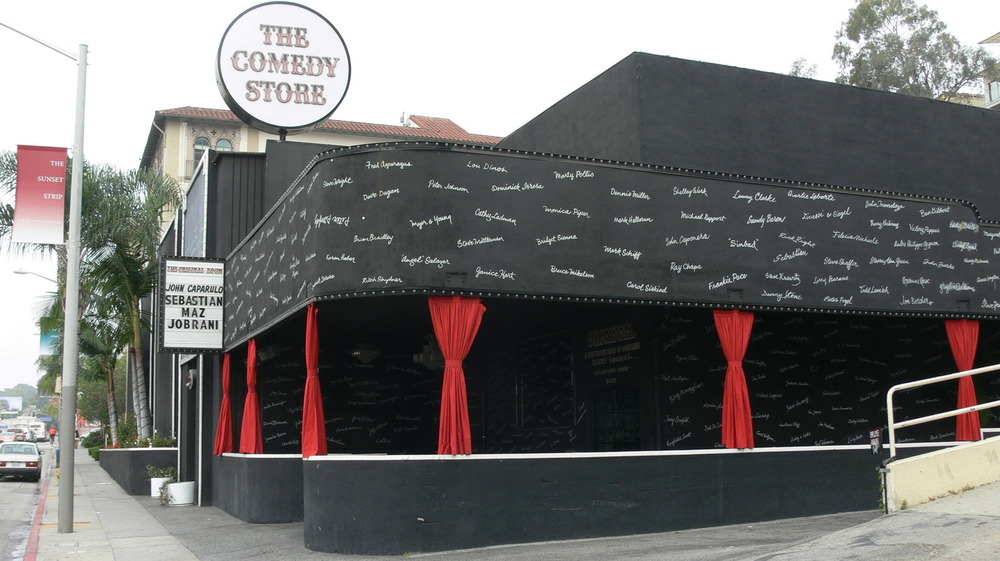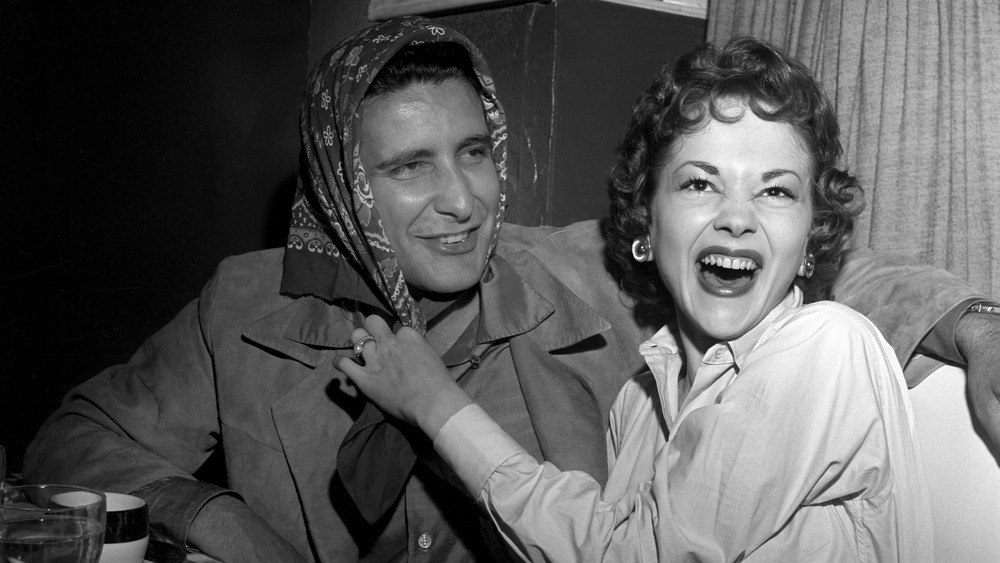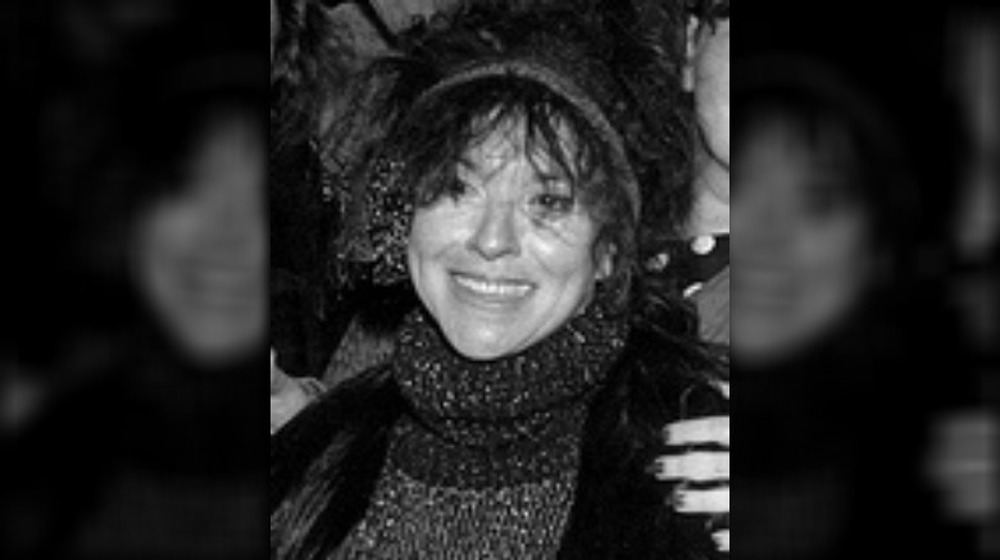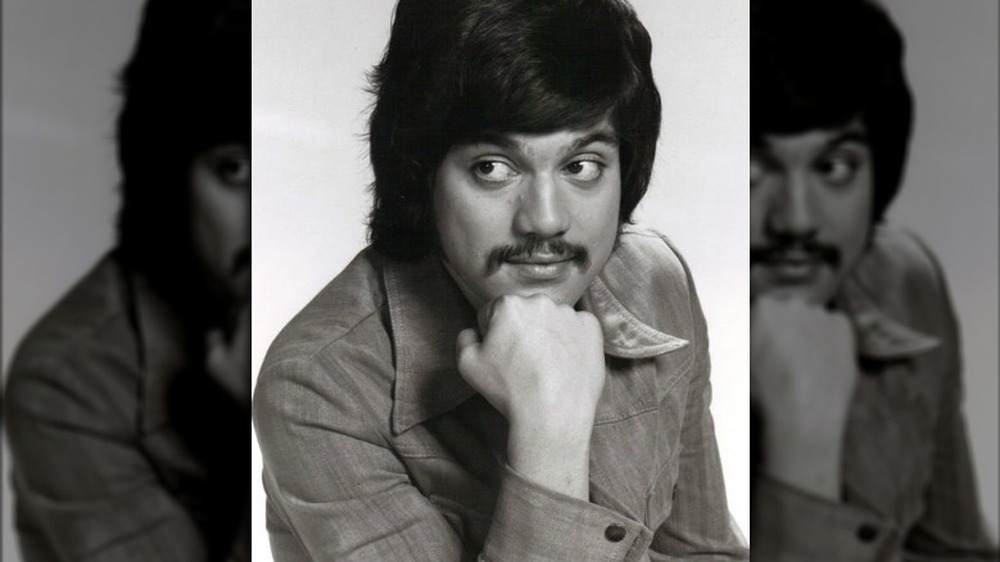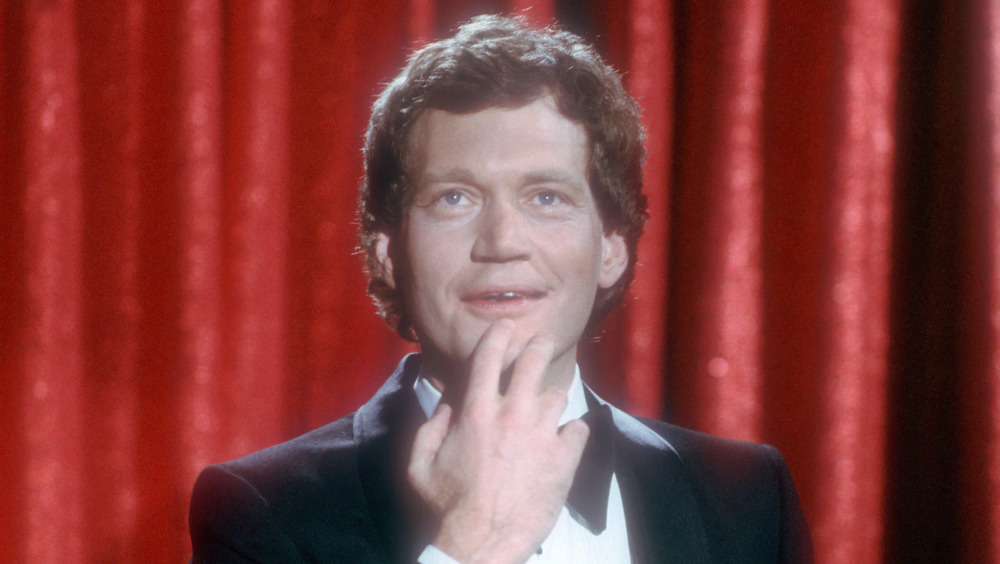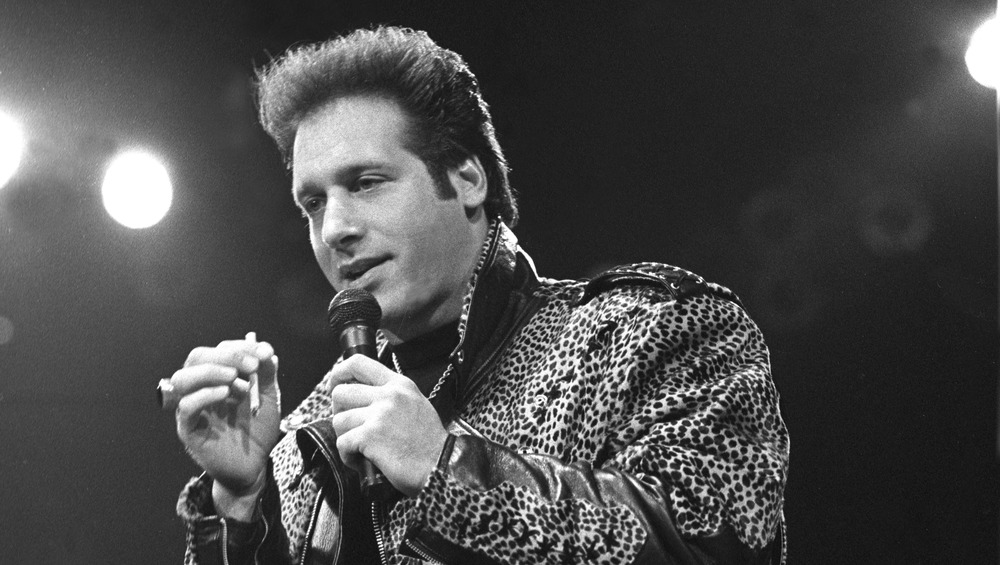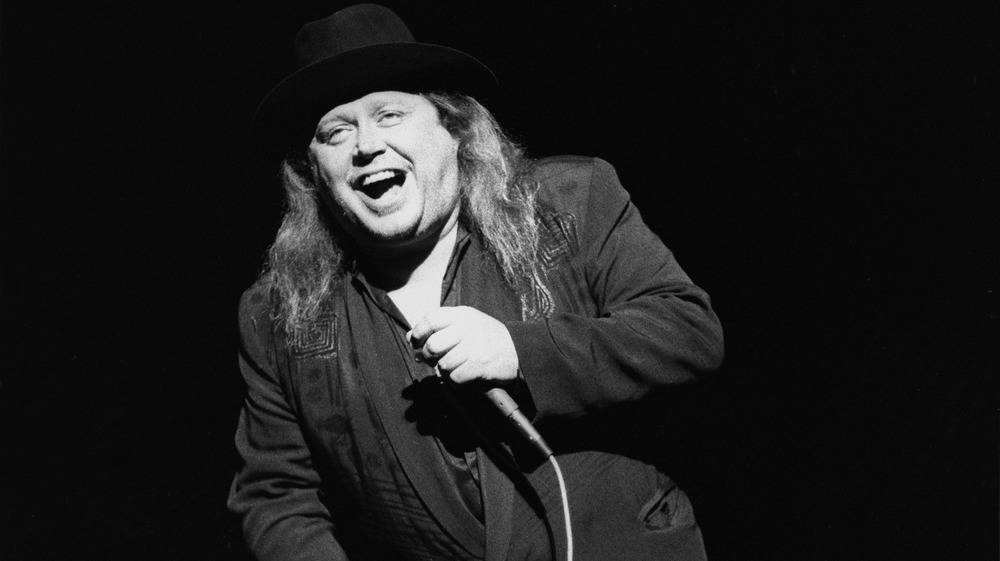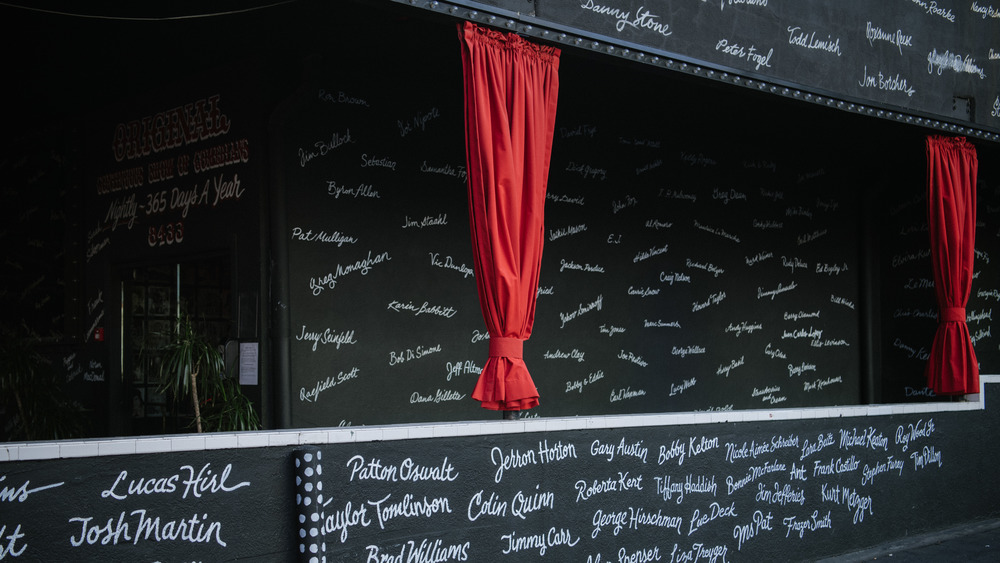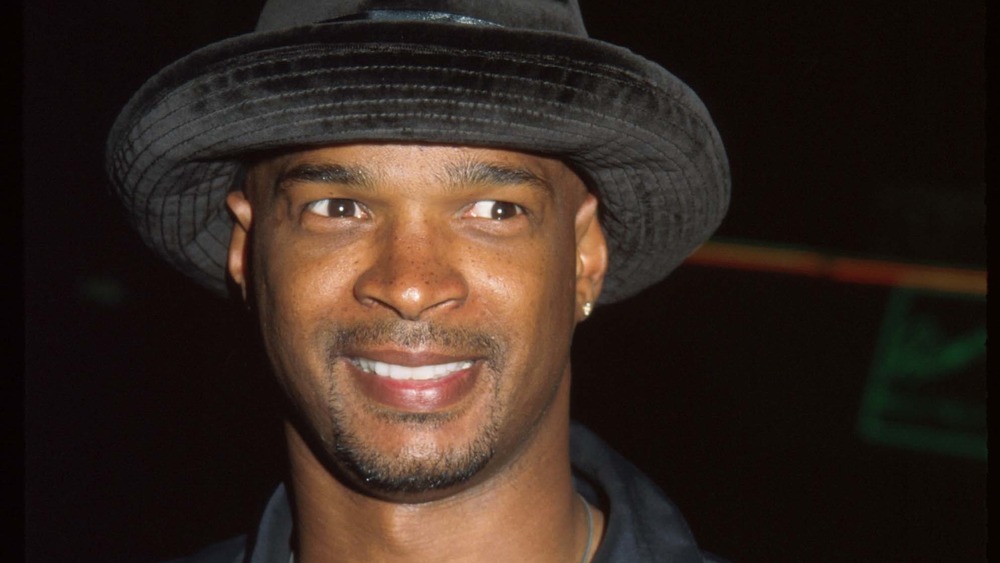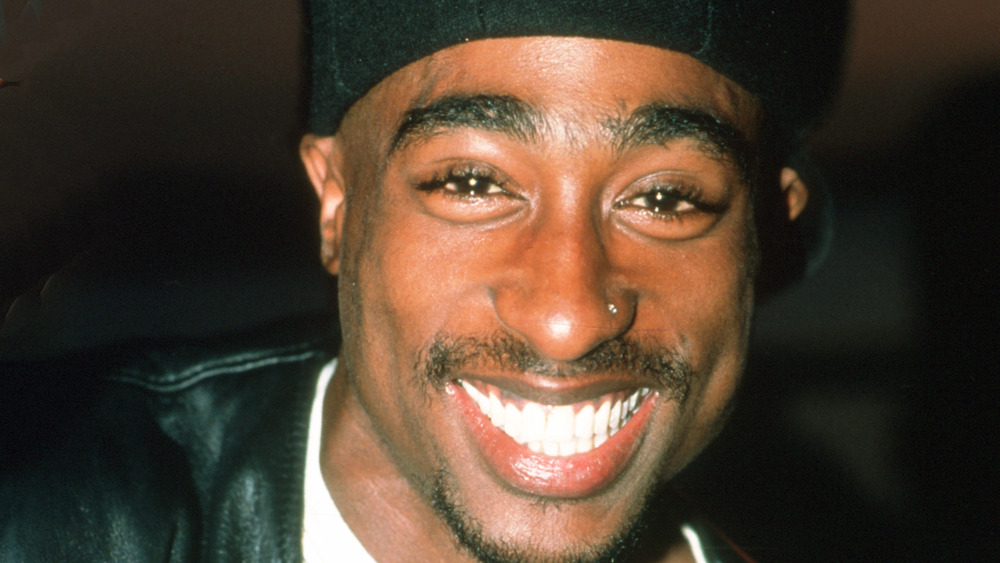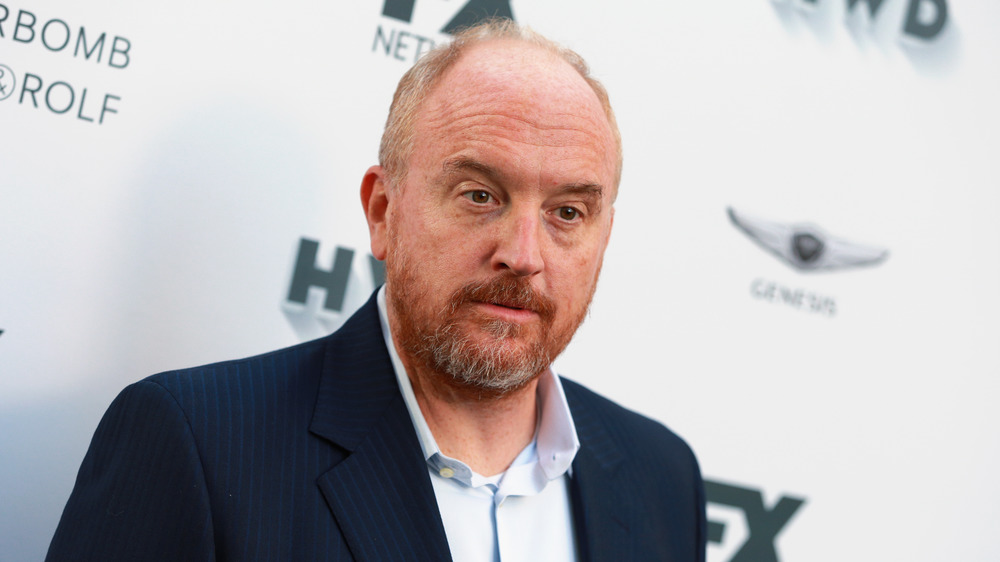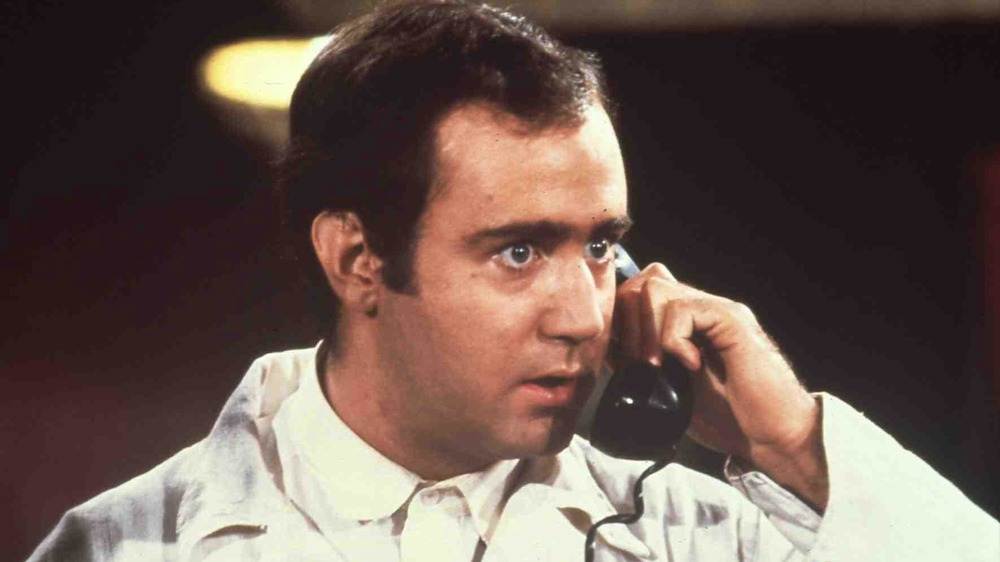The Dark Organization Behind Some Of The World's Biggest Comedians
Robin Williams, Richard Pryor, Jay Leno, Jim Carrey, Gary Shandling, and Whoopi Goldberg, just to name a few, all started their careers at the Comedy Store in Los Angeles, California. The "Store" is a comedy venue that has been operating on 8433 Sunset Boulevard since 1972. Marc Maron, host of the WTF podcast and documenter of "Store" lore, talked about his time there in an interview with Buzzfeed: "I started to hear voices in my head, to see the Store as this vast, weird part of some dark, mystical conspiracy." Any time Maron discusses the Store, he describes it as a black vortex where all the negative matter of the heart is unleashed when one decides to be a standup comedian: addiction, competition, desperation, dysfunction, inhibition, and violence.
The Comedy Store itself has three separate areas to see shows: the Main Room, the Original Room, and the Belly Room upstairs. In Maron's memoir, Jerusalem Syndrome, he describes the inside of the Store as "labyrinthine and done in red in black," featuring "gothic deco" with "hidden rooms behind all the stages." Outside, the club is painted black with names of comics written in white. Maron refers to it as a "goofy rendition of the Vietnam War Memorial [...] only the names on the wall of the Store had died a different death." Ultimately, Marc was convinced, "The Comedy Store is a dark temple of fear and pain that to this day I believe is built over one of the gates to Hell."
The Comedy Store was once a hangout for celebrities and mobsters
William Wilkerson, high-stakes gambler, entrepreneur, and friend to the mob, opened Ciro's supper club at 8433 Sunset Boulevard in 1940. Jim Byron, the club's publicist, was quoted in Dancing at Ciro's as saying, "The club was a world unto itself, and in that world your every emotion got exaggerated — by inebriation, music, by the beauty of the people around you." Its clientele included colossal celebrities of the '40s and '50s such as Marilyn Monroe, Joan Crawford, Frank Sinatra, Sammy Davis Jr., Lucille Ball, and Desi Arnaz. The list goes on to include the most notorious gangsters of its time as well — Bugsy Seigel and Mickey Cohen.
While celebrities ate, drank, and watched big bands and burlesque shows, downstairs in the basement, Mickey Cohen was "working." According to the Los Angeles Public Library, Ciro's was Cohen's "base of operations," where "henchmen were beat, tortured, and killed" and "showgirls and mob girlfriends received illegal abortions, with at least one woman dying from her abortion." Curbed LA writes that Bugsy Siegel was a business partner of Wilkerson's. He frequented the club, held large parties there, and, when in prison, demanded to have food from Ciro's kitchen delivered to him. Wilkerson and Bugsy went on to open the Flamingo in Las Vegas, and Ciro's went under new ownership and was ultimately closed in 1959.
The Comedy Store's mercurial mother — Mitzi Shore
In 1972, Sammy Shore, Vegas comedian, was given space to perform regularly at the former Ciro's. According to the book Comedy at the Edge, it was Sammy's wife, Mitzi, who coined it "The Comedy Store." When Sammy was out of town performing, Mitzi ran the Store seemingly better than him — almost too well. Whenever Sammy came back and wanted to do a spot, Mitzi would say, "You can't. The show is booked. Call me tomorrow." The couple divorced in 1974, with Sammy leaving the club to Mitzi.
In Comedy at the Edge, Mitzi is described as a "pretty, petite brunette with a whiny, Roseanne [Barr]-like voice" who was both a "dean and a den mother." The Comedy Store was Mitzi's opportunity to come out from Sammy's "shadow" and shine as the comedy club's owner and career creator. David Letterman is quoted as saying, "Mitzi was a maternal influence. She had this place where we could all come, be silly and make mistakes [...] [I] found this life and friends and creative outlet. And without Mitzi I don't know what I would have done."
Mitzi Shore's managerial style has faced criticism. Her tastes in comedians appeared capricious and ever-changing. Mike Binder, director and comedian, said, "Mitzi was very nice to me the first few years. But she turned very dark. She wanted to control all of us." Marc Maron told Standard Hotels, "Mitzi was the queen and everybody sort of operated in a certain amount of fear of her and need to impress her."
Freddie Prinze, the Comedy Store's first fallen star
In 1973, Freddie Prinze, 19, was seen at the Comedy Store and booked for a spot on The Tonight Show. He made everyone laugh so hard that, according to Vulture, Prinze "became the first comic ever summoned to the couch by Carson after his first shot." Afterward, he was cast as the lead in the TV show Chico and the Man. Letterman said of Prinze, "it became pretty clear to me what the formula was [...] You move to Los Angeles, you go to a place called The Comedy Store, you get on the Tonight Show."
Prinze became a superstar overnight, dating models and riding in limos. Freddie, despite his success, had been a drug addict since he was 16. Entertainment Weekly writes, "he became a five-gram-a-day addict and bought Quaaludes by the hundreds," and "he played Russian roulette in front of horrified friends."
In the recent docuseries The Comedy Store, comedians confirm Prinze's drug use and obsession with death. ExBulletin, reporting on the series, quotes Jimmy Walker (Good Times) as saying Prinze was "furious" when John Travolta rose to fame for Welcome Back, Kotter. Jimmy said, "[H]e bought a crossbow and planned to kill Travolta. [...] Prinze shot three arrows in Travolta's door." According to the Telegram & Gazette, reporting on the docuseries, "Prinze was troubled, and died young from a self-inflicted gunshot wound in 1977. The film shows a parade of his fellow comedians emerging from the church after his funeral — shocked, grieving, but no less ready to go on stage whenever Mitzi asked."
If you or anyone you know is having suicidal thoughts, please call the National Suicide Prevention Lifeline at 1-800-273-TALK (8255).
Mitzi and the comics go to war
Mitzi Shore insisted on not paying comics on the grounds that the Store was a comedy college, giving comedians space and an opportunity to grow their career. Comedian and former Chicago Teamster Tom Dreesen said to Time, "I told Mitzi, 'You pay the waiters, you pay the waitresses, you pay the guy who cleans the toilets. Why don't you at least pay the comedians?'" Many of the most successful comedians could not afford food or gas.
In 1979, led by Jay Leno and David Letterman, the comedians tried to form a union and went on strike. This created a huge rift in the family-like feel of the Store. When Mitzi saw Letterman picketing, she is quoted by Time as saying, "I was crying." Argus Hamilton, who still performs at the Store to this day, said, "It broke her heart."
After six weeks of war, Mitzi gave in and decided to pay the regular comedians $25 a set, but she remembered who was loyal and who was not. One comedian and striker, Steve Lubetkin, was banned from working at the Store. LA Weekly recounts that Lubetkin was devastated and "committed suicide by jumping off the roof of the Continental Hyatt House across the street." He left a note that read: "My name is Steve Lubetkin. I used to work at the Comedy Store..."
If you or anyone you know is having suicidal thoughts, please call the National Suicide Prevention Lifeline at 1-800-273-TALK (8255).
Cresthill, the debaucherous comedian abode
In 1976, Mitzi purchased the building for The Comedy Store, which came with a companion property directly behind it — a condo known as "Cresthill." Mitzi allowed comedians to live and party there at their leisure.
The '80s brought a comedy boom, giving comedians more money than what they knew what to do with, "much of which started going up people's noses," as Buzzfeed puts it. The outlet quotes Corey Feldman as saying, "On any given night you might find as many as 10 or 12 comedians at Cresthill, crowded around the massive oak table, in the center of which was a mountain of cocaine." According to The Roanoke Times, Pauly Shore, Mitizi's son and a well-known comedian himself, said Sam Kinison babysat him and "would do big lines of cocaine off [his] forehead."
Cresthill stories are endless. Andrew Dice Clay (pictured above) got so mad when the kitchen was dirty that he threw dishes out the window. Sam Kinison hung out with Satanists, played with guns, and peed on Marc Maron's bed (per Buzzfeed). In the late 1980s, Mitzi got tired of seeing the comedians wreck the place and their abuse of drugs. She kicked everyone out and turned Cresthill into a halfway house for comedians recovering from addiction.
The rise and fall of Sam Kinison
Sam Kinison, a former Pentecostal preacher, started his stand-up career in Houston, Texas. Argus Hamilton, the first resident of Cresthill, met Sam there during a comedy competition. The two shared a huge ball of cocaine at an after-party, and Argus encouraged Sam to go to LA and check out the Comedy Store, according to Buzzfeed.
In an article for GQ, Dylan Jones describes Kinison as "the most rock n' roll comic to ever fill an auditorium." He was well-known for the way he carried himself, his famous "screaming," and also the lifestyle he lived. Kinison is quoted as saying, "My view of life is, 'If you're going to miss heaven, why miss it by two inches? Miss it!'" Sam stayed up all night partying and driving around LA with an entourage of devoted followers and women, and he even released his own rendition of "Wild Thing."
While Sam could bring in the crowds, his comedy career never turned out the way it did for other comedians like Richard Pryor, Robin Williams, and Kinison's biggest frenemy, Andrew Dice Clay. Eventually, CAA (Kinison's agency) dropped him, and he became more and more unhinged. On an appearance on Saturday Night Live, he complained about people claiming he carried guns and freebased cocaine. Sam's older brother, Bill, encouraged Sam to get clean, and Sam entered rehab. Sadly, not long after, Sam died in a car accident in 1992.
People believe the Comedy Store is haunted
Recently, the Comedy Store was the subject of the Travel Channel show Ghost Adventures. According to the episode's description, "Performers and staff have reported paranormal activity throughout the building, and the crew hopes to get to the root of these numerous sightings," and "Kinison is one of the several spirits rumored to be haunting The Comedy Store." According to the Los Angeles Public Library, people have also claimed to have seen "a man in 1940s garb walking around the premises and through walls. They have heard a woman wailing in the basement when no one was there, and have experienced strange pranks such as chairs stacking themselves in the middle of the stage and perfectly set tables becoming unset." But is it true?
On a guided tour at the Store, Eli Countryman reports for the Daily Bruin that the décor "lends itself to spooky vibes when nobody else is in the room, and the mirrors could easily create strange shadows, but nothing out of the ordinary occurred when I walked through." Argus Hamilton tells the Daily Bruin that comics often played arcade games in he Comedy Store and saw things in their peripheral vision but would turn their heads to ultimately find nothing.
A culture of homophobia, racism, and sexism
In the docuseries The Comedy Store, sexism and racism are explored. Some of the best Black, Latinx, queer, and/or female comedians in the world came out of the club, including Richard Pryor, Freddie Prinze, Sandra Bernhard, and Roseanne Barr, but then you hear multiple stories of straight white males working their way up in the system by being "door guys." Was the problem the Store or the culture of comedy itself?
According to Indiewire, BIPOC only account for about "16 percent of the talking heads" in the docu-series. One of them, Damon Wayans, tells of a time when Mitzi forced him into "a duo with a white comedian called Salt & Pepper." According to The Hollywood Reporter, the Comedy Union, a venue for Black performers, was created to provide a space to Black comics who were having trouble getting stage time in mainstream clubs. "The club was founded by Enss Mitchell, a former Comedy Store booker." The Comedy Store gave a statement to The Hollywood Reporter denying any discrimination.
Was Mitzi Shore sexist? In Psychology Today, Judy Carter says Mitzi created the Belly Room as a "safe space" for female comedians, away from the male comics that "dominated the stage with sexist, homophobic, and racial stereotyping jokes." The room was small and tucked away, so it was rarely received by an audience or industry. Carter says, "There were mixed feelings about it." Many comics used the anonymity to take chances, but comedians like Marsha Warfeild remarked, "Separate does not mean equal."
Sunset Boulevard or the Wild West?
When reading stories about the Comedy Store, guns tend to come up. One wild tale involves Tupac Shakur, a Comedy Store superfan. According to Joey Diaz on his podcast The Church of What's Happening Now, Tupac "was at the Store to see Eddie [Griffin] [...] and there was a shootout." Supposedly, the gunfight began in the Main Room and led out the front door to Sunset Boulevard and continued in the street. Joey claims you can still see bullet holes in the building of the Sky Bar across from the Store.
Not terribly surprisingly, there's also a tale involving Sam Kinison firing a "warning shot" at Andrew Dice Clay, according to The Comedy Store website, with a picture to prove it. In 2014, LAist covered reports that Kat Williams pulled a gun on a heckler. And as recently as 2015, according to the Park LaBrea News & Beverly Press, a Comedy Store patron was shot while standing on the patio — the suspect got away.
Comedy Store comedians who destroyed their own career
It seems as if every comedian who comes out of the Comedy Store is marked by some tragedy, and sometimes, it's their own fault. Roseanne Barr got her start at the Store and went on to star in one of the most successful sitcoms of all time. According to The Guardian, just as the Roseanne reboot was renewed for a second season, Roseanne tweeted a racist comment about Valerie Jarrett, former senior advisor to the Obama administration. Her show was cancelled, and her character was killed off for the spin-off The Conners.
Many comedians have been taken to task for sexual misconduct in the #MeToo aftermath, most famously Louis C.K. While Louis didn't get his start at the Comedy Store, he did finish a comedy special there right before, ironically enough, Roseanne Barr spoke to The Daily Beast about a rumor that he was engaging in sexual misconduct. Later, The New York Times published interviews with five women who came forward to accuse him of sexual misconduct. Louis lost TV deals, comedy specials, and film roles, but you can certainly find him speaking as if nothing happened on Showtime's docuseries The Comedy Store.
Comedians accused of faking their own death
Comedians made the Comedy Store their home, and when they went on to become famous, the rest of the world felt as if they knew them as well. That's why when a comedian dies, it not only shakes the Store but also those who love to laugh. Andy Kaufman, a completely unique voice in comedy, died of lung cancer in 1984, and his death reached Elvis and Tupac levels of conspiracy. In fact, according to the LA Times in 1985, "a year after his death, he had Hollywood out to see if he had pulled the ultimate stunt — the successful faking of his own death." Tony Clifton, Andy Kaufman's alter ego as a "Vegas lounge singer," was still performing at The Comedy Store, after all.
Bill Hicks, who was often compared to Lenny Bruce, died of pancreatic cancer in 1994 at age 32. Many fans and fellow comedians were saddened that his career was cut short. Strangely enough, there's a conspiracy theory about his death. According to Texas Monthly, some believe Alex Jones is actually Bill Hicks and was "recruited by the CIA to become the controlled opposition by the mainstream media." Then again, Bill Hicks would be 59 years old today, and Alex Jones is 46.
Mitzi Shore passes away at age 87
The Comedy Store's creator, Mitzi Shore, passed away on April, 11, 2018. Before her death, according to the LA Times, she suffered from "Parkinson's disease and other neurological problems," which led to a dispute between her sons Pauly and Peter, who went to court to fight over ownership of the club. It is unclear what their roles are following her death.
Mitzi's passing brought about expressions of gratitude for the creation of the Store and her contribution to comedians' careers. Variety quotes Joe Rogan as saying, "The Comedy Store was one of the most important things in the history of stand up comedy, and I will forever be in her debt. Thank you Mitzi!" The list goes on — Kathy Griffin, Fortune Feimster, Patton Oswalt, Al Madrigal, etc. Her son, Pauly, remembered her on Twitter. He described her as a "giver," stating, "She gave her heart, soul, and her stages. [...] Not only were you our comedy Godmother, you are my mother. We'd be nothing without you and your guidance."
